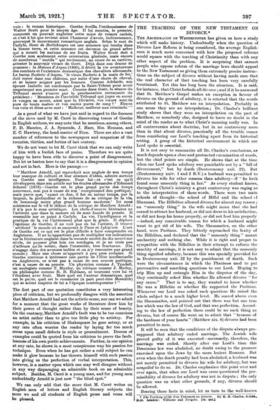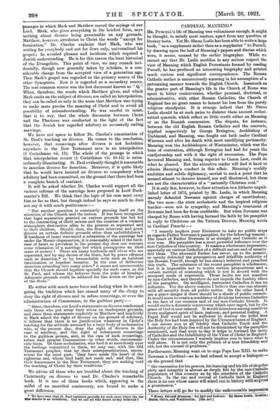THE TEACHING OF THE NEW TESTAMENT ON
DIVORCE.*
Tam ARCHDEACON or Wzsmazturrza has given us here a study which will make history. Undoubtedly when the question of Divorce Law Reform is being considered, the average English. man is much more concerned with how the proposed reforms would square with the teaching of .Christianity than with any other aspect of the problem. It is surprising that earnest people who oppose reform of the marriage laws should appeal to the New Testament as giving them extremely precise instruc- tions on the subject of divorce without having made sure that the real character of that teaching has been very carefully scrutinized. Yet this has long been the situation. It is said, for instance, that Christ forbade all divorce ; and if it be answered that St. Matthew's Gospel makes an exception in favour of divorce on the ground of adultery, it is retorted that the words attributed to St. Matthew are an interpolation. Probably in one sense they are an interpolation ; Dr. Charles's brilliant study shows that they were an interpolation on the part of Matthew, or somebody else, designed to leave no doubt in the mind of the reader as to what Christ's meaning really was. In all controversies about doctrine, but in no controversy more than in that about divorce, practically all the trouble comes from considering our Lord's teaching apart from its historical setting. A grasp of the historical environment in which our Lord spoke is essential.
It is not easy to summarize all Dr. Charles's conclusions, as much depends upon a close and protracted examination of words, but the chief points are simple. He shows that at the time when our Lord spoke adultery was punishable not by a " bill of divorcement," but by death (Deuteronomy xxii. 22). But (Deuteronomy xxiv. 1 and 2 R.V.) a husband was permitted to divorce his wife for other reasons than adultery—if " he bath found some unseemly thing in her." As every student knows, throughout Christ's ministry a great controversy was raging as to the interpretation of these words. There were two main schools of thought—the school of Hillel and the school of Shammai. The Hillelites allowed divorce for almost any reason ; an " unseemly thing" in the wife might mean that she had ceased to attract her husband, or did not dress to his satisfaction, or did not keep his house properly, or did not feed him properly —indeed, any conceivable reason for which a husband might want to get rid of his wife. The Shammaites, on the other hand, were Puritans. They bitterly reproached the laxity of the Hillelites, and declared that the " unseemly thing " meant unchastity and nothing else. While it is right and proper to sympathize with the Hillelites in their attempt to enforce the sanctity of marriage, it is not easy to admit that the unseemly thing signified adultery, because this was specially provided for in Deuteronomy xxii. 22 by the punishment of death. Such were the circumstances in which the Pharisees used to put provocative and searching questions to our Lord. Hoping to trip Him up and entangle Him in the disputes of the day, they continually asked Hint whether He allowed divorce " for any cause." That is to say, they wanted to know whether He was a Hillelite or whether He supported the Puritans. Whenever our Lord was asked such questions Ho raised the whole subject to a much higher level. He soared above even the Shammaites, and pointed out that there was but one true law which was the law of God, and that was perfection. Accord- ing to the law of perfection there could be no such thing as divorce, but of course He went on to admit that " because of the hardness of your hearts" (Matthew xix. 8) divorce had been permitted to men.
It will be seen that the conditions of the dispute always pre- supposed that adultery ended marriage. The Jewish wife proved guilty of it was executed—necessarily, therefore, the Marriage was ended. Shortly after our Lord's time this Draconian law was abolished, no doubt owing to the pressure exercised upon the Jews by the more lenient Romans. But even when the death penalty had been abolished, a husband was not merely permitted to divorce his wife for adultery, but was compelled to do so. Dr. Charles emphasizes this point over and over again, that when our Lord was cross-questioned the per- missibility of divorce for adultery was not in dispute ; the only question was on what other grounds, if any, divorce should be allowed.
Bearing these facts in mind, let us turn to the well-known
• The. Teaching of the New Testament on Divorce.. By A. IL Oberlin.
D.D. London:' Williams and itorgate. nat4
paaeages in which Mark and Matthew record the sayings of our Lord. Mark, who gives everything in the briefest form, says nothing about divorce being permissible on any grounds. Matthew, however, attributes to Christ the words " except for fornication." Dr. Charles explains that Mark, who was writing for everybody and not for Jews only, universalized his gospel ; he avoided phrases and incidents which required a Jewish understanding. He Is, for this reason the least historical of the Evangelists. This point of view, we may remark inci- dentally, though now generally taken by scholars, is a con- siderable change from the accepted view of a generation ago. Then Mark's gospel was regarded as the primary source of the other Synoptists. Now it is regarded as a secondary source. The real common source was the lost document known as " Q."
When, therefore, the words which Matthew gives, and which Mark omits on the subject of divorce, are called an interpolation, they can be called so only in the sense that Matthew was trying
to make more precise the, meaning of Christ and to avoid all possibility of misunderstanding. He was careful to insist,
that is to say, that the whole discussion between Christ and the Pharisees was conducted in the light of the fact that the Jewish law regarded adultery as necessarily ending marriage.
We have not space to follow Dr. Charles's examination of St. Paul's teaching on divorce. He comes to the conclusion, however, that remarriage after divorce is not forbidden anywhere in the New Testament save in an interpolation
(1 Corinthians vii. 11). The whole of the passage in which that interpolation occurs (1 Corinthians vii. 1045) is extra- ordinarily illuminating. St. Paul evidently thought it reasonable to sanction divorce for desertion. Moreover, it is quite likely that he would have insisted on divorce as compulsory when
adultery had been committed, on the ground that there had been a complete breach of contract.
It will be asked whether Dr. Charles would support all the various reforms of the marriage laws proposed in Lord Buck- master's Bill. We think that.the logic of his case must carry him as far as that, but though indeed he says as much he does not say it with much positiveness :-
" But another question is constantly pressing itself on the attention of the Church and the nation. It has been recognized that legal separation granted on various grounds has but led to the contracting of illicit unions and the creation of a vitiated atmosphere destructive alike to the persons so separated and to their children. Should, then, the State intervene and grant divorce on certain definite grounds other than unfaithfulness ? If hardness of heart warranted a relaxation of the marriage law under the Mosaic dispensation, it is.reasonably asked if the hard- ness of heart so prevalent in the present day does not warrant some relaxation of a marriage law which presupposes an ideal state of society ? There are many husbands and wives who are separated, not by any decree of the State, but by grave offences such as desertion.,* or by irremediable evils such as habitual intoxication or hopeless insanity. In the case of deliberate desertion extending into many years,* it seems not unreasonable that the Church should legislate specially for such cases, as did St. Paul, and release the believer from the yoke of bondage. Adequate grounds could be adduced for like action on the part of the. State.'
He writes with much more force and feeling when he is casti- gating the tradition which has caused many of the clergy to
deny the right of divorce and to refuse remarriage, or even the administration of Communion, to the guiltless party:— "Since, therefore, our Lord's statements on divorce condemned only those who put away their wives on inadequate grounds, and since these statements explicitly in Matthew and implicitly in Mark admit the right of divorce on the ground of adultery, it follows that there is no justification whatever in Christ's teaching for the attitude assumed by a large body of ecclesiastics who, at the present day, deny the right of divorce in the case of adultery, and the right of subsequent remarriage- to the guiltless person, and, in the case of such remarriage, refuse such persons Communion—in other words, excommuni- cate them. Of these ecclesiastics, who lord it so mercilessly over the heritage committed to them, we may say, with the Old Testament prophet, that by their misrepresentations, uncon- scious .for the most part, ' they have made the heart of the righteous sad, whom God hath not made sad,' and that, like their forerunners in the New Testament, they are making void the teaching of Christ by their traditions."
We advise all those who are troubled about the teaching of Christianity on divorce to read Dr. Charles's remarkable book. It is one of those books which, appearing in the midst of an unsettled controversy, are bound to make a great difference.
• We have seen that Bt. Paul legislates specially for such cases where the one who &mita la-an 'unbeliever. Can we call all who desert to-day believers I



































 Previous page
Previous page